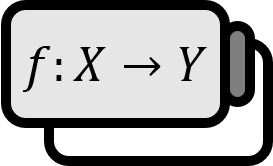Any Function Can Always Be Expressed as the Sum of Odd and Even Functions
Theorem
The arbitrary function $f$ defined in $\mathbb{R}$ can always be expressed as a sum of an even function and an odd function.
Proof
Let $f_{e}(t)$ and $f_o(t)$ be as follows.
$$ f_{e}(t)=\dfrac{ f(t)+f(-t)}{2},\ \ \ f_o(t)=\dfrac{ f(t)-f(-t)}{2} $$
Then, $f_{e}(t)$ is an even function, and $f_o(t)$ is an odd function, and the following equation holds.
$$ f_{e}(x)+f_o(x)=f(x) $$
■
